
The enormous changes in twentieth-century Chinese higher education up to the Sino-Japanese War are detailed in this pioneering work. Yeh examines the impact of instruction in English and of the introduction of science and engineering into the curriculum. Such innovations spurred the movement of higher education away from the gentry academies focused on classical studies and propelled it toward modern middle-class colleges with diverse programs.
Yeh provides a typology of Chinese institutions of higher learning in the Republican period and detailed studies of representative universities. She also describes student life and prominent academic personalities in various seats of higher learning. Social changes and the political ferment outside the academy affected students and faculty alike, giving rise, as Yeh contends, to a sense of alienation on the eve of war.

Once a powerful figure who reversed the disintegration of China and steered the country to Allied victory in World War II, Chiang Kai-shek fled into exile following his 1949 defeat in the Chinese civil war. As attention pivoted to Mao Zedong’s communist experiment, Chiang was relegated to the dustbin of history.
In Chiang Kai-shek’s Politics of Shame, Grace C. Huang reconsiders Chiang’s leadership and legacy by drawing on an extraordinary and uncensored collection of his diaries, telegrams, and speeches stitched together by his secretaries. She paints a new, intriguing portrait of this twentieth-century leader who advanced a Confucian politics of shame to confront Japanese incursion into China and urge unity among his people. In also comparing Chiang’s response to imperialism to those of Mao, Yuan Shikai, and Mahatma Gandhi, Huang widens the implications of her findings to explore alternatives to Western expressions of nationalism and modernity and reveal how leaders of vulnerable states can use potent cultural tools to inspire their country and contribute to an enduring national identity.

Once a powerful figure who reversed the disintegration of China and steered the country to Allied victory in World War II, Chiang Kai-shek fled into exile following his 1949 defeat in the Chinese civil war. As attention pivoted to Mao Zedong’s communist experiment, Chiang was relegated to the dustbin of history.
In Chiang Kai-shek’s Politics of Shame, Grace C. Huang reconsiders Chiang’s leadership and legacy by drawing on an extraordinary and uncensored collection of his diaries, telegrams, and speeches stitched together by his secretaries. She paints a new, intriguing portrait of this twentieth-century leader who advanced a Confucian politics of shame to confront Japanese incursion into China and urge unity among his people. In also comparing Chiang’s response to imperialism to those of Mao, Yuan Shikai, and Mahatma Gandhi, Huang widens the implications of her findings to explore alternatives to Western expressions of nationalism and modernity and reveal how leaders of vulnerable states can use potent cultural tools to inspire their country and contribute to an enduring national identity.

This book explores the Daoist encounter with modernity through the activities of Chen Yingning (1880–1969), a famous lay Daoist master, and his group in early twentieth-century Shanghai. In contrast to the usual narrative of Daoist decay, with its focus on monastic decline, clerical corruption, and popular superstitions, this study tells a story of Daoist resilience, reinvigoration, and revival.
Between the 1920s and 1940s, Chen led a group of urban lay followers in pursuing Daoist self-cultivation techniques as a way of ensuring health, promoting spirituality, forging cultural self-identity, building community, and strengthening the nation. In their efforts to renew and reform Daoism, Chen and his followers became deeply engaged with nationalism, science, the religious reform movements, the new urban print culture, and other forces of modernity.
Since Chen and his fellow practitioners conceived of the Daoist self-cultivation tradition as a public resource, they also transformed it from an “esoteric” pursuit into a public practice, offering a modernizing society a means of managing the body and the mind and of forging a new cultural, spiritual, and religious identity.

After the May Fourth Incident, John Dewey’s followers in China assumed the leadership of an important group of intellectuals who were largely veterans of the New Culture movement. The Chinese Communist movement had its inception in the same two years Dewey lectured in China (1919–1921); Dewey’s followers pitted their “liberalism” against this new radical alternative, in arguments that proved to be harbingers of a thirty-year conflict in Chinese politics.
The Dewey Experiment in China critically analyzes the careers and writings of John Dewey’s followers through the 1920s—particularly Kuo Ping-wen, Chiang Meng-lin, and T’ao Hsing-chih—as they attempted to implement Dewey’s political reform ideas and his progressive educational principles. The “new education” reform movement was spearheaded by Deweyites and directed a national-level educational reform effort for many years following World War I. Many of Dewey’s ideas that seemed most progressive in the United States are shown to be surprisingly conservative for China. The promise of progress implicit in problem-solving based upon conflicts in actual, concrete social conditions, as Dewey formulated it, deluded its proponents with a false hope of efficacy. The issue of political power was not adequately addressed. In education, unspoken assumptions about progressive reform in the United States proved to be absent in China.
The most dedicated Deweyites were forced to “turn Dewey on his head” by the end of the 1920s. What appeared to Dewey to be democracy through interest-group bartering among nations was often understood in “Third World” China as Big Power politics and the exploitation of the weak. The Dewey Experiment in China reflects, therefore, not only upon Dewey’s own thought but upon the fragility of many American ideas assumed to have been applicable again after World War II in China and Southeast Asia.
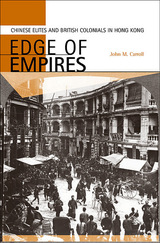
In an engaging, revisionist study, John M. Carroll argues that in the century after the Opium War, Hong Kong's colonial nature helped create a local Chinese business elite.
By the end of the nineteenth century, the colonial government saw Chinese businessmen as allies in establishing Hong Kong as a commercial center. The idea of a commercially vibrant China united them. Chinese and British leaders cooperated on issues of mutual concern, such as the expansion of capitalism and political and economic directions for an ailing China.
These Chinese also found opportunities in the colonial system to develop business and commerce. In doing so, they used Hong Kong's strategic position to underscore their own identity as a distinctive group unlike their mainland counterparts. Nationalism took on a specifically Hong Kong character. At the same time, by contributing to imperial war funds, organizing ceremonies for visiting British royalty, and attending imperial trade exhibitions, the Chinese helped make Hong Kong an active member of the global British Empire.
In Edge of Empires, Carroll situates Hong Kong squarely within the framework of both Chinese and British colonial history, while exploring larger questions about the meaning and implications of colonialism in modern history.
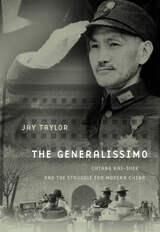
One of the most momentous stories of the last century is China’s rise from a self-satisfied, anti-modern, decaying society into a global power that promises to one day rival the United States. Chiang Kai-shek, an autocratic, larger-than-life figure, dominates this story. A modernist as well as a neo-Confucianist, Chiang was a man of war who led the most ancient and populous country in the world through a quarter century of bloody revolutions, civil conflict, and wars of resistance against Japanese aggression.
In 1949, when he was defeated by Mao Zedong—his archrival for leadership of China—he fled to Taiwan, where he ruled for another twenty-five years. Playing a key role in the cold war with China, Chiang suppressed opposition with his “white terror,” controlled inflation and corruption, carried out land reform, and raised personal income, health, and educational levels on the island. Consciously or not, he set the stage for Taiwan’s evolution of a Chinese model of democratic modernization.
Drawing heavily on Chinese sources including Chiang’s diaries, The Generalissimo provides the most lively, sweeping, and objective biography yet of a man whose length of uninterrupted, active engagement at the highest levels in the march of history is excelled by few, if any, in modern history. Jay Taylor shows a man who was exceedingly ruthless and temperamental but who was also courageous and conscientious in matters of state. Revealing fascinating aspects of Chiang’s life, Taylor provides penetrating insight into the dynamics of the past that lie behind the struggle for modernity of mainland China and its relationship with Taiwan.
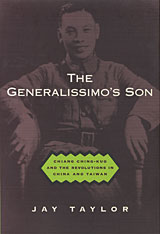
Chiang Ching-kuo, son and political heir of Generalissimo Chiang Kai-shek, was born in 1910, when Chinese women, nearly all illiterate, hobbled about on bound feet and men wore pigtails as symbols of subservience to the Manchu Dynasty. In his youth Ching-kuo was a Communist and a Trotskyite, and he lived twelve years in Russia. He died in 1988 as the leader of Taiwan, a Chinese society with a flourishing consumer economy and a budding but already wild, woolly, and open democracy. He was an actor in many of the events of the last century that shaped the history of China's struggles and achievements in the modern era: the surge of nationalism among Chinese youth, the grand appeal of Marxism-Leninism, the terrible battle against fascist Japan, and the long, destructive civil war between the Nationalists and the Communists. In 1949, he fled to Taiwan with his father and two million Nationalists. He led the brutal suppression of dissent on the island and was a major player in the cold, sometimes hot war between Communist China and America. By reacting to changing economic, social, and political dynamics on Taiwan, Sino-American rapprochement, Deng Xiaoping's sweeping reforms on the mainland, and other international events, he led Taiwan on a zigzag but ultimately successful transition from dictatorship to democracy.
Jay Taylor underscores the interaction of political developments on the mainland and in Taiwan and concludes that if China ever makes a similar transition, it will owe much to the Taiwan example and the Generalissimo's son.
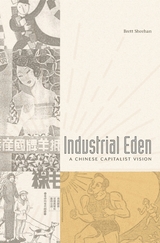
This illuminating study of the evolution of Chinese capitalism chronicles the fortunes of the Song family of North China under five successive authoritarian governments. Headed initially by Song Chuandian, who became rich by exporting hairnets to Europe and America in the early twentieth century, the family built a thriving business against long odds of rural poverty and political chaos.
A savvy political operator, Song Chuandian prospered and kept local warlords at bay, but his career ended badly when he fell afoul of the new Nationalist government. His son Song Feiqing—inspired by the reformist currents of the May Fourth Movement—developed a utopian capitalist vision that industry would redeem China from foreign imperialism and cultural backwardness. He founded the Dongya Corporation in 1932 to manufacture wool knitting yarn and for two decades steered the company through a constantly changing political landscape—the Nationalists, then Japanese occupiers, then the Nationalists again, and finally Chinese Communists. Increasingly hostile governments, combined with inflation, foreign competition, and a restless labor force, thwarted his ambition to create an “Industrial Eden.”
Brett Sheehan shows how the Song family engaged in eclectic business practices that bore the imprint of both foreign and traditional Chinese influences. Businesspeople came to expect much from increasingly intrusive states, but the position of private capitalists remained tenuous no matter which government was in control. Although private business in China was closely linked to the state, it was neither a handmaiden to authoritarianism nor a natural ally of democracy.
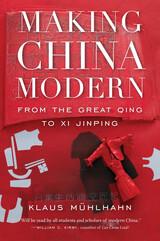
“Thoughtful, probing…a worthy successor to the famous histories of Fairbank and Spence [that] will be read by all students and scholars of modern China.”
—William C. Kirby, coauthor of Can China Lead?
It is tempting to attribute the rise of China to Deng Xiaoping and to recent changes in economic policy. But China has a long history of creative adaptation. In the eighteenth century, the Qing Empire dominated a third of the world’s population. Then, as the Opium Wars and the Taiping Rebellion ripped the country apart, China found itself verging on free fall. More recently, after Mao, China managed a surprising recovery, rapidly undergoing profound economic and social change. A dynamic story of crisis and recovery, failure and triumph, Making China Modern explores the versatility and resourcefulness that guaranteed China’s survival, powered its rise, and will determine its future.
“Chronicles reforms, revolutions, and wars through the lens of institutions, often rebutting Western impressions.”
—New Yorker
“A remarkable accomplishment. Unlike an earlier generation of scholarship, Making China Modern does not treat China’s contemporary transformation as a postscript. It accepts China as a major and active player in the world, places China at the center of an interconnected and global network of engagement, links domestic politics to international dynamics, and seeks to approach China on its own terms.”
—Wen-hsin Yeh, author of Shanghai Splendor
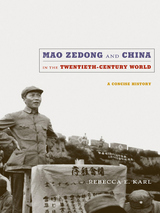

China’s status in the world of expanding European empires of the nineteenth and early twentieth centuries has long been under dispute. Its unequal relations with multiple powers, secured through a system of treaties rather than through colonization, has invited debate over the degree and significance of outside control and local sovereignty. Navigating Semi-Colonialism examines steam navigation—introduced by foreign powers to Chinese waters in the mid-nineteenth century—as a constitutive element of the treaty system to illuminate both conceptual and concrete aspects of this regime, arguing for the specificity of China’s experience, its continuities with colonialism in other contexts, and its links to global processes.
Focusing on the shipping network of open treaty ports, the book examines the expansion of steam navigation, the growth of shipping enterprise, and the social climate of the steamship in the late nineteenth century as arenas of contestation and collaboration that highlight the significance of partial Chinese sovereignty and the limitations imposed upon it. It further analyzes the transformation of this regime under the nationalism of the Republican period, and pursues a comparison of shipping regimes in China and India to provide a novel perspective on China under the treaty system.
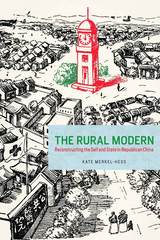
In The Rural Modern, Merkel-Hess shows that Chinese reformers and intellectuals created an idea of modernity that was not simply about what was foreign and new, as in Shanghai and other cities, but instead captured the Chinese people’s desire for social and political change rooted in rural traditions and institutions. She traces efforts to remake village education, economics, and politics, analyzing how these efforts contributed to a new, inclusive vision of rural Chinese life. Merkel-Hess argues that as China sought to redefine itself, such rural reform efforts played a major role, and tensions that emerged between rural and urban ways deeply informed social relations, government policies, and subsequent efforts to create a modern nation during the communist period.
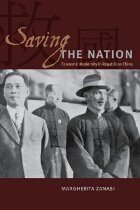
Economic modernity is so closely associated with nationhood that it is impossible to imagine a modern state without an equally modern economy. Even so, most people would have difficulty defining a modern economy and its connection to nationhood. In Saving the Nation, Margherita Zanasi explores this connection by examining the first nation-building attempt in China after the fall of the empire in 1911.
Challenging the assumption that nations are products of technological and socioeconomic forces, Zanasi argues that it was notions of what constituted a modern nation that led the Nationalist nation-builders to shape China’s institutions and economy. In their reform effort, they confronted several questions: What characterized a modern economy? What role would a modern economy play in the overall nation-building effort? And how could China pursue economic modernization while maintaining its distinctive identity? Zanasi expertly shows how these questions were negotiated and contested within the Nationalist Party. Silenced in the Mao years, these dilemmas are reemerging today as a new leadership once again redefines the economic foundation of the nation.

This manual for students focuses on archival research in the economic and business history of the Republican era (1911–1949). Following a general discussion of archival research and research aids for the Republican period, the handbook introduces the collections of archives in the People’s Republic of China and the Republic of China on Taiwan that contain materials in the areas of economics and business, with data on the history of the archives, descriptions of their holdings, and publications on their collections.
The second half of the work consists of guided readings in Republican-era documents, such as government decrees, regulations, and business letters, with complete vocabulary lists and explanations of terms. Also included with the handbook are facsimile reproductions of these documents.
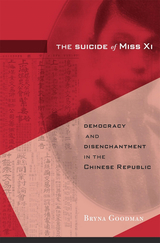
A suicide scandal in Shanghai reveals the social fault lines of democratic visions in China’s troubled Republic in the early 1920s.
On September 8, 1922, the body of Xi Shangzhen was found hanging in the Shanghai newspaper office where she worked. Although her death occurred outside of Chinese jurisdiction, her US-educated employer, Tang Jiezhi, was kidnapped by Chinese authorities and put on trial. In the unfolding scandal, novelists, filmmakers, suffragists, reformers, and even a founding member of the Chinese Communist Party seized upon the case as emblematic of deep social problems. Xi’s family claimed that Tang had pressured her to be his concubine; his conviction instead for financial fraud only stirred further controversy.
The creation of a republic ten years earlier had inspired a vision of popular sovereignty and citizenship premised upon gender equality and legal reform. After the quick suppression of the first Chinese parliament, commercial circles took up the banner of democracy in their pursuit of wealth. But, Bryna Goodman shows, the suicide of an educated “new woman” exposed the emptiness of republican democracy after a flash of speculative finance gripped the city. In the shadow of economic crisis, Tang’s trial also exposed the frailty of legal mechanisms in a political landscape fragmented by warlords and enclaves of foreign colonial rule.
The Suicide of Miss Xi opens a window onto how urban Chinese in the early twentieth century navigated China’s early passage through democratic populism, in an ill-fated moment of possibility between empire and party dictatorship. Xi Shangzhen became a symbol of the failures of the Chinese Republic as well as the broken promises of citizen’s rights, gender equality, and financial prosperity betokened by liberal democracy and capitalism.
READERS
Browse our collection.
PUBLISHERS
See BiblioVault's publisher services.
STUDENT SERVICES
Files for college accessibility offices.
UChicago Accessibility Resources
home | accessibility | search | about | contact us
BiblioVault ® 2001 - 2024
The University of Chicago Press









